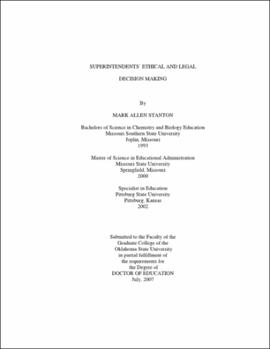| dc.contributor.advisor | Stern, A. Kenneth | |
| dc.contributor.author | Stanton, Mark Allen | |
| dc.date.accessioned | 2013-11-26T08:34:55Z | |
| dc.date.available | 2013-11-26T08:34:55Z | |
| dc.date.issued | 2007-07 | |
| dc.identifier.uri | https://hdl.handle.net/11244/7589 | |
| dc.description.abstract | Scope and Method of Study. This study was to identify and examine superintendents' decision patterns that emerged when ethical and legal dimensions were in conflict, and to determine any differences between these decision patterns. The data were gathered through an online questionnaire from a sample of 517 superintendents in North Dakota, New Mexico and Texas during the fall of 2006. The questionnaire gathered demographic data on the sample and data related to superintendents' decision making when dilemmas occurred between ethics and law. The analysis of data involved frequency distributions, percentages, measures of central tendency, standard deviations, and paired sample t-tests. | |
| dc.description.abstract | Findings and Conclusions. The demographic data revealed: Superintendents who held a higher degree and were responsible for more students received longer contracts from school boards; superintendent experience and tenure are inversely proportional to the size of the school district, compensation and contract length; female superintendents earn a doctorate at a higher rate than male superintendents and school boards hiring females with a doctorate reward them with higher compensation than males; over the last five years, many new superintendents have entered the job market and, as a result, fewer jobs will be available for new superintendents; those responsible for superintendent preparation have determined the most feasible way to address ethical issues is through a course integration approach. Data gathered on the research questions revealed that when superintendents were asked to select either an ethical or legal response they were able to do so with same accuracy. The superintendents' decision response pattern that emerged when conflict existed between ethics and law was an ethical one. There was a significant difference found in superintendents' ethical and legal decision response patterns. Superintendent preparation programs should consider, in addition to course integration of ethics instruction, stand alone classes on ethical and legal problem solving. Superintendent associations, school board associations, and state professional development centers should provide many opportunities for current superintendents to hone their problem solving on ethical and legal issues. | |
| dc.format | application/pdf | |
| dc.language | en_US | |
| dc.rights | Copyright is held by the author who has granted the Oklahoma State University Library the non-exclusive right to share this material in its institutional repository. Contact Digital Library Services at lib-dls@okstate.edu or 405-744-9161 for the permission policy on the use, reproduction or distribution of this material. | |
| dc.title | Superintendents' ethical and legal decision making | |
| dc.contributor.committeeMember | Fry, Pamela | |
| dc.contributor.committeeMember | Harris, Edward L. | |
| dc.contributor.committeeMember | Mathers, Judith K. | |
| osu.filename | Stanton_okstate_0664D_2367 | |
| osu.accesstype | Open Access | |
| dc.type.genre | Dissertation | |
| dc.type.material | Text | |
| dc.subject.keywords | superintendents' ethical and legal decision making | |
| thesis.degree.discipline | Educational Administration | |
| thesis.degree.grantor | Oklahoma State University | |
